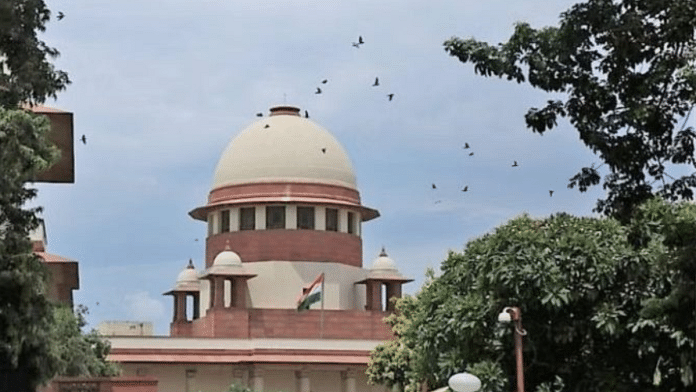New Delhi: Taking a “hands-off approach”, the Supreme Court Friday adjourned an application filed by the Association for Democratic Reforms (ADR), an NGO, seeking directions to the Election Commission (EC) to publish booth-wise voter turnout figures and to make the Form 17C vote tally records available online within 48 hours of polling for each phase of the ongoing Lok Sabha polls.
The court noted that with five phases of elections already completed and two pending (the sixth phase was held the following day), it would be difficult for the EC to allocate the necessary resources at this juncture.
The SC then adjourned the interlocutory application filed by the NGO on 9 May, saying that granting any interim relief would amount to granting relief in the main petition pending before the court since 2019. The court then asked ADR to list the matter before a regular bench after the court’s summer vacation.
The main petition filed by ADR in 2019 sought directions from the Supreme Court to order the EC to completely stop the practice of announcing election results based on provisional and estimated data, prior to an actual and accurate reconciliation of data.
Additionally, ADR also sought directions for the EC to evolve an efficient, transparent, rational and robust procedure by creating a separate department/grievance cell for investigation of discrepancies in election data and for responding to electors’ queries on the same.
Meanwhile, before the hearing in the case, the EC Wednesday filed an affidavit opposing ADR’s request, saying that making Form 17C publicly accessible online could be prone to manipulation, including the alteration of images, which could potentially sow the seeds of “widespread discomfort and mistrust” among the public.
Moreover, the EC invoked Article 329 (b) of the Constitution to prevent the court from hearing the matter and said this provision prohibits judicial intervention in the working of the commission in the middle of the election process.
On Friday, Justices Dipankar Datta and S.C. Sharma, in agreement with the EC’s contention, said that judicial intervention was barred in the present circumstances in view of Article 329(b).
Against this backdrop, ThePrint explains Article 329(b) and its significance within the electoral framework.
Also Read: HC allows survivor of alleged marital rape to terminate pregnancy — ‘reminder of trauma, agony’
What is Article 329(b)
Enshrined in Part XV of the Constitution, articles 324-329 specifically discuss elections.
While Article 324 gives the poll panel powers to direct and control elections, Article 329, which has two clauses, concerns itself with the role of the judiciary in electoral matters.
Article 329 (a) says the “judiciary is not allowed to challenge the constitutionality of laws relating to the boundaries of electoral districts or the allocation of seats, while Article 329 (b) says that any challenges to the conduct or results of elections to the Houses of Parliament or state legislatures must be made through a designated legal process that is referred to as an “election petition”.
The Constitution (19th Amendment) Act of 1966 refined clause (b) of Article 329, stipulating that election-related inquiries are exclusively addressed through election petitions presented to the authority designated by that law.
The Representation of the People Act, 1951, furthers this clause as it empowers the high courts to hear and decide election petitions. A decision in such petitions can be challenged in the Supreme Court.
Court verdicts on election petitions
In its stand before the Supreme Court Wednesday, the EC invoked Article 329(b) because in its view the application filed by the Association of Democratic Reforms amounted to questioning the electoral process while it was on.
This, according to the commission, could only be done under a statutory framework as envisaged in Article 329(b), which is by filing an election petition under the Representation of the People Act, 1951.
Meanwhile, courts, through several pronouncements, outlined the contours of Article 329(b) and its applicability.
For instance, in 1999, the Supreme Court in K. Venkatachalam vs A.Swamickan determined that Article 329(b) is inapplicable if the matter pertains to Articles 191 and 193, which deal with disqualifications and penalties related to parliamentary and legislative assembly membership, respectively.
The judgment further held that the word “election” would include every process of proceedings after the issuance of election notification.
However, in 1985, the Supreme Court in Inderjit Barua vs Election Commission of India excluded electoral roll preparation from the definition of “election.” It further said that no election could be challenged on the grounds of defects in electoral rolls.
Furthermore, a 2007 Gujarat High Court judgment in N.C. Patel vs State of Gujarat affirmed that election petitions can only be filed under the Representation of People’s Act, 1951, and not by way of a writ petition.
Meanwhile, the Allahabad High Court in 2002, in Hari Krishna Lal vs Atal Bihari Bajpai, clarified that only candidates officially recognised by the Election Commission are eligible to file election petitions.
By merely filing a nomination paper, a person does not become a duly nominated candidate. A candidate becomes a nominated candidate when the EC recognises him to be a valid candidate fulfilling all the statutory obligations.
Uttkarsh Mishra is a first-year law student with NALSAR and is interning with ThePrint.
(Edited by Richa Mishra)
Also Read: Lack of evidence, not enough proof he shielded son Prajwal – court order granting H.D. Revanna bail



